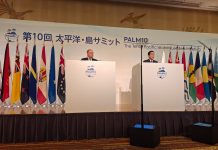The waters of the Pacific Islands countries (PICs) are home to numerous aquatic species that are listed in the CITES Appendices, and which support livelihoods and economic opportunities for communities in over a dozen Parties to the Convention. The sustainable use of these species and the regulation of their trade is of paramount importance for their conservation.
To support national authorities of selected PICs in meeting their commitments under the Convention, the CITES Secretariat and the Food and Agriculture Organisation of the United Nations (FAO) through the Development Law Service (LEGN) of the Legal Office, jointly organized a three-day subregional training workshop, which was held online from 15 to 17 November 2021. FAO Subregional Office for the Pacific Islands (FAO SAP) and FAO Offices in the concerned countries also collaborated in the organization of the workshop. The objective of the workshop was to train representatives of national fisheries administrations, CITES Management and Scientific Authorities and other relevant institutions on strengthening cooperation between fisheries and CITES authorities for the effective implementation of CITES in the fisheries sector.
About 45 participants from Fiji, Palau, Papua New Guinea, Samoa, Solomon Islands, Tonga and Vanuatu took part in the training. Representatives from Australia, New Zealand, the United States of America, four regional organisations – the Pacific Islands Forum Fisheries Agency (FFA), Secretariat of the Pacific Community (SPC), the Secretariat of the Pacific Regional Environment Programme (SPREP), and the Western and Central Pacific Fisheries Commission (WCPFC) – and fisheries experts from the civil society organizations attended the workshop as well. FAO’s Fisheries and Aquaculture Division shared vital information and provided critical insights to the workshop participants, in particular on the relevance to CITES of FAO’s Port States Measures Agreement (PSMA) and Catch Documentation Scheme (CDS Guidelines) and association technical guidelines.
Participants were provided with:
an overview of CITES key principles and requirements and their applicability in the fisheries sector;
*Clarifications on commercially exploited aquatic species listed in CITES Appendix II, opportunities for collaboration between CITES and fisheries authorities, correlations between CITES and fisheries management;
*Introduction on how to use the FAO-CITES Legal Study and Guide;
*The relevance of FAO’s PSMA and CDS; and knowledge-sharing on practical experiences of CITES implementation at national and regional levels.
Despite the challenges of the virtual nature of the workshop, participants interacted and worked together in country teams to conduct two sets of exercises. The first was a practical exercise that involved answering a short questionnaire based on the FAO-CITES Legal Study and Guide, and assessing key CITES elements in fisheries legislation and vice versa based on the guide. The second was a brainstorming exercise to explore how CITES implementation could be enhanced through national fisheries legal frameworks.
Simon Kumi, Senior Foreign Service Officer of the Department of Foreign Affairs and International Trade of of Papua New Guinea (PNG) expressed appreciation for the training.
He stated that “One of the concrete steps that PNG will take after the workshop is to ensure that all the relevant agencies, including PNG’s National Fisheries Authority, the Conservation and Environment Protection Authority and other organisations responsible for maritime, customs, foreign affairs and police, meet regularly to be made aware of CITES and its impact”. The participants representing other PICs made similar commitments.
In his remarks during the closing of the Workshop, Juan Carlos Vasquez, Chief of the legal affairs unit of the CITES Secretariat hailed that “the workshop as an important milestone in the cooperation between CITES and FAO and will become a model to replicate in other regions”.
Blaise Kuemlangan, Chief of LEGN in expressing his agreement and thanking the workshop participants, remarked that “The Pacific region, which has always been known to push the envelope and to be at the forefront of ensuring responsible fisheries management, is again leading the way on CITES implementation within the fisheries sector and combating IUU fishing”.
SOURCE: CITIES/PACNEWS


















